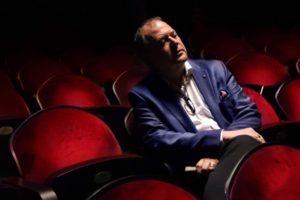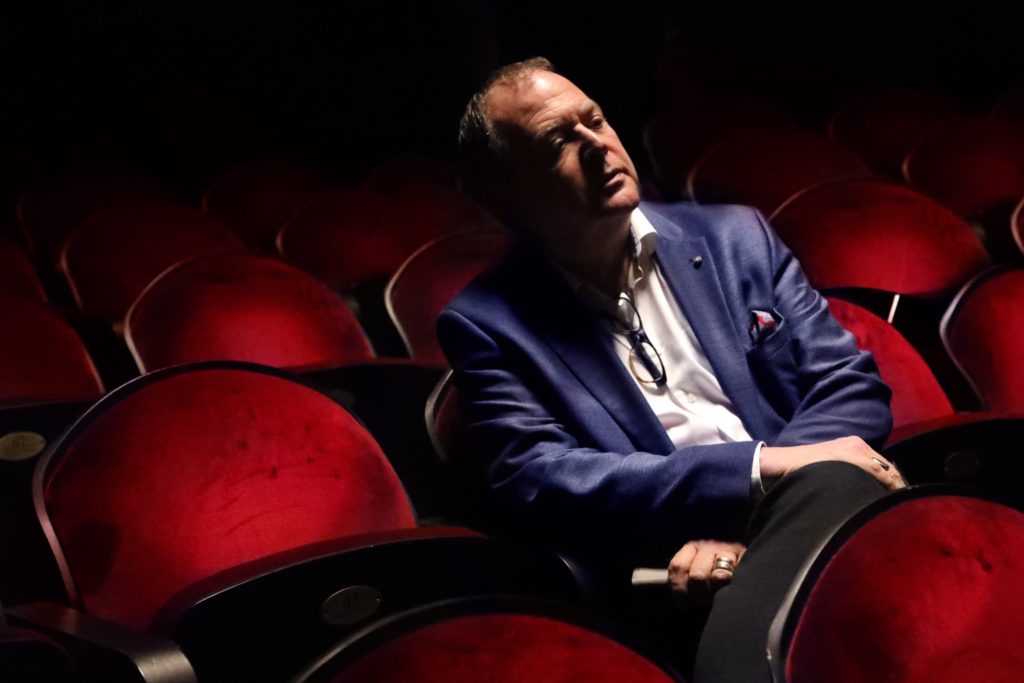Q & A: Dieter Kaegi On The Blackwater Valley Opera Festival’s Emergence & Direction
By Alan Neilson
Reproduced with thanks to www.operawire.com
 During early June, tucked away in the Blackwater Valley in Ireland’s southeast, the small town of Lismore plays host to Ireland’s other opera festival.
During early June, tucked away in the Blackwater Valley in Ireland’s southeast, the small town of Lismore plays host to Ireland’s other opera festival.
Not nearly as famous as the Wexford Festival, the Blackwater Valley Opera Festival has been slowly developing its profile, and attracting the attention of a wider public, although it still remains relatively unknown outside Ireland.
The Artistic Director and co-founder of the festival, Dieter Kaegi, was kind enough to find time to talk to Operwire about the festival, its history and his hopes for its future.
Operawire: Why have you spent such a large part of your career in Ireland? What attracted you to the country?
Dieter Kaegi: I can remember very clearly the first time I came to Ireland, it was to direct “Così Fan Tutte.” For a young Swiss man to come to Dublin, at that time, was an amazing experience, it was so tolerant, you could do what you want without being observed and threatened. It was so unlike Switzerland, just blew me away! It was so open and tolerant, like I had never experienced before. That is apart from the wonderful people and the countryside, and I became addicted to the country.
One possible explanation is that the speaking voice of Irish people is grounded in their body. In other nationalities you have the feeling that the voice is not fully connected. In the case of Irish women their tessitura is half an octave lower than for French women for example, and this connects the body to the voice, and I believe this allows them to produce so many good singers.
Also the folk music, and their interest in music in general, is embedded in the culture, like in Scandinavian countries, and again this enables the country to produce so many good singers.
OW: Could you outline the background of the decision to set up the Blackwater Valley Opera Festival (previously the Lismore Opera Festival)?
DK: I set up Lismore Opera Festival with Jennifer O’Connell in 2010. We had both been working for Opera Ireland for many years. In 2010, during the financial crisis, the Arts Council and Department of Culture fell out about its funding policy, and it was decided that Opera Ireland would no longer be financed, and it came to an end. So we wanted to do something to ensure that opera in Ireland would continue, and also we wanted to find work for all these talented Irish singers. We looked around and found this castle in Lismore, which opened its doors to us. And this year we are celebrating our tenth year there.
It is probably correct to say that if Opera Ireland hadn’t collapsed we would not have established the Lismore Opera Festival.
OW: What were the original aims for the festival?
DK: Firstly, we wanted to keep opera going after the collapse of Opera Ireland. Then we also wanted to create a platform for Irish singers, to find and nourish new, talent. We wanted to provide them with singing opportunities, and to help their careers.
The chorus was an enormously important part of Opera Ireland. Every singer, over those years, who established an international career came through their chorus; there was such quality there, and it would have been a disaster to leave this behind, we knew we had to find a new way of continuing to work with them. There were so few opportunities for such an abundance of talent, so that singers had go abroad if they want a career in opera. We wanted to help them.
OW: To what extent have you achieved these aims?
DK: The fact that we are still here proves it is a success. Many festival pop up and disappear. It is never easy to survive, and for this we must thank all the people who have involved themselves with the festival, especially Michael and Giancarla Alen-Buckley who have helped us financially over the years. Because of the many people who have given their time and financial help we have managed to grow year-on-year; we have grown in size, we have more activities, the quality of the work has improved and we have bigger audiences. In the first year we did two days, just two performances with a couple of recitals. Now we have four performances with about 20 events, concerts and recitals.
Of course, we want to expand further. We are always planning for the future, for the long-term, and not so long-term, and very soon we hope to be able to increase the size of the festival so that it spans two weekends, covering a full week, with more master classes and activities. We recognize that opera requires long-term planning, and that building the festival takes time, but is not impossible to achieve, and based on the results over the past few years I am very optimistic that this will become a reality.
OW: Why was the Lismore Opera Festival relaunched as the Blackwater Valley Opera Festival in 2018?
DK: It had to do with our new management structure, and the fact we wanted to refocus the festival towards the whole of the Blackwater Valley, and not just the town of Lismore. It is a breathtakingly beautiful valley, with big country houses, so why not take advantage of the fact. The valley really is stunning, even by Irish standards, and the owners of the country houses are happy to open them up to the festival audience.
OW: Who are your target audience?
DK: Starting in our first year, we opened up the dress rehearsal to local schools. Every year we expose several hundred children to opera for the first time in their lives. It is an absolutely fantastic experience to watch the children, who really don’t know what to expect. In the first five minutes they find it weird and funny, but it only takes a short time to get their full attention, and they love it. They can follow it because the recitatives are in English, although ensembles and arias are in the original language. This has been really successful, and we intend to expand on this, and increase our efforts to reach a young audience.
At the moment, the audience for the main opera is mainly Irish, and mainly from the South East, although many people come from Cork, or come down from Dublin. To a small extent, it is correct to think that we are aiming at a more well-off, monied audience, similar to Glyndebourne, and so in the same way, we offer dining facilities. In many ways, this is inevitable as the attractions in the area appeal to that particular socio-economic group, but we do make attempts to counterbalance this, as for example with our school’s policy.
The age profile of the audience is also very mixed; we get families with their children, young couples under 30. We have a much younger audience than other institutions I work with, or have worked for, and this is very encouraging.
The fact that the festival takes place during a bank holiday weekend also means we are able to reach people who are able to travel, and therefore, we are now attracting an audience from a wide geographical area within Ireland.
It is also very satisfying that the majority of the audience who came in year one, still attend. In fact, all the people who supported it during the early years are very proud of the festival and of what it is has achieved.
DK: First of all, we operate during a different time period; we are a summer festival, Wexford is in October.
Also, we are a truly Irish festival; we have an Irish orchestra, we have an Irish chorus, who are all young, future professional singers from DIT in Dublin, and the soloists are Irish. It is very important for us that the local community identify with the festival, and as I said, the people are very proud of the festival.
The setting is really spectacular, and therefore, the festival offers something really unique in this respect, with its castle, country houses and scenery. Our venues are really special. Some of the smaller events are actually hosted in the large country house in the area, and are very popular because it allows the audience the chance to see inside these grand houses and gardens, which are normally not open to the public. It is also another way of embedding the opera in to the fabric of the community here in Blackwater.
In the events that surround the main opera, we put on concerts and recitals by Irish composers, such as the 20th century instrumental composer, Ina Boyle.
So we have a completely different identity to Wexford.
We have strong friends scheme which helps us a lot, and even our sponsors do not really clash with Wexford. Maybe there would be, if we went to a big Irish bank, as they probably already sponsor Wexford, but otherwise we are able to exist alongside Wexford. It is not a problem and we have our own distinct identity.
OW: The choice of operas tend to be conservative, mainly Mozart or Rossini, and this year, you are performing “Don Pasquale.” Why such a conservative program?
DK: It is part of our long-term strategy. We created a new festival and needed to get an audience. It takes time for an audience to trust you, and for them to accept the operas you put on, so the choice of operas has to be carefully developed.
Also at the beginning we only had a small orchestra. In the first year we had an orchestra of six. We also had a limited chorus. So we were limited in our choices. Over the years we have built our audience and our orchestra and chorus has grown. This year we will use surtitles for the first time. So we are now coming to the point were we can start to produce operas that are not so conservative. I don’t think we would still be here now, if we had started with operas by Britten and Shostakovich
OW: This year you are performing a piano reduction of Balfe’s “The Sleeping Queen.” This is very different from the main opera? Why was it chosen?
DK: This is also part of our strategy in developing our audience. Eventually we want to put Balfe on the main stage. We have now developed our core audience, so we can now start to bring in lesser-known works. We have developed their trust, and this is a step towards broadening the operas we shall be performing here at the Blackwater Valley Opera Festival.
We will perform it in the Cathedral. It is a fantastic venue, with stained glass windows by Burne-Jones, with excellent acoustics, which we also use for some of our other concerts.
OW: Why is it called an opera festival when it contains so much more?
DK: Opera is the main focus of the festival, it takes up most of the costs and most of our time. Although there are many non-opera events, they don’t take up the same amount of time, resources or effort. We started as an opera festival and it will remain an opera festival.
OW: Apart from your role at the Blackwater Valley Opera, what other plans do you have over the coming 12 months?
DK: In my role as the General Director of Theatre and Orchestra at Biel, in Switzerland, I have lot of work to do preparing for the forthcoming 2019/2020 season. We plan to perform a double bill of “Radames,” by Eotvos, and “Lohengrin,” by Sciarrino, in Bolzano in January, 2020. And in May we have been invited by Oslo Opera to perform our award winning production of Udo Zimmermann’s “Weise Rose,” which we will also be taking to Krakow in Poland in 2020.
We will be dong new productions of: “La fille du Régiment,” directed by Andrea Bernard, a young, up-and-coming, Italian director; “Sweeney Todd,” directed by Olivier Tambosi; Verdi’s Giovanna d’Arco; and I will be directing a Bartok’s “Bluebeard’s Castle,” and “Les Liaisons Dangereuses” by Vivaldi.
Link to online article here


